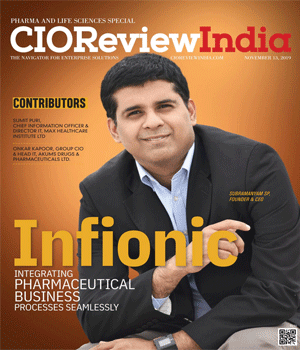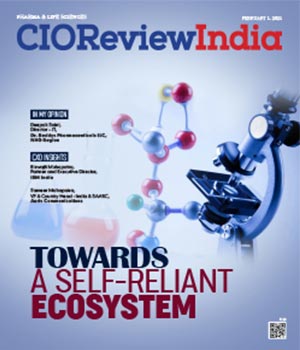
Using Technology to Improve Customer Engagement and Increase Health Insurance Penetration
Antony Jacob, Chief Executive Officer, Apollo Munich Health Insurance | Wednesday, 20 September 2017, 04:56 IST
 Technology in its multitude of forms, has taken over our lives, as people not only use tech devices for communication but also for entertainment, education, shopping, et al. Companies across a gamut of segments including Retail, IT, Banking, FMCG, etc. are adopting technology to enable faster output, better customer service and sustainable business models.
Technology in its multitude of forms, has taken over our lives, as people not only use tech devices for communication but also for entertainment, education, shopping, et al. Companies across a gamut of segments including Retail, IT, Banking, FMCG, etc. are adopting technology to enable faster output, better customer service and sustainable business models.
The insurance industry in the country has started making inroads into using technology to increase the service standards while enhancing the overall customer experience. Technology is also helping to increase the health insurance penetration by empowering advisors with easy to use technical solutions.
Advanced technologies set to spur a fundamental transformation of the insurance industry include cloud computing, advanced analytics, mobile phones, digital platforms and artificial intelligence (AI). These are expected to help insurers determine new ways of engaging with customers and reduce cost, improve efficiency, and expand insurability.
This shift towards technology solutions is being led by Millennials. Millennials, whose exposure to digital technology and innovative platforms from an early age have made them the first generation of “digital natives”. They are beginning to move into their peak earning and spending years and have become an influential segment of the population. Their high expectations for technology-based services, convenience, transparency, speed, regular engagement, and a personalized experience that reflects their needs are defining how products and services are delivered. Their preferences and expectations are a particular challenge for the insurance industry. This is how the early adopters of technology in insurance sector are bringing about a paradigm shift -
• Technology is enabling insurers to create new avenues to enhance the customer experience at every touch point while increasing customers’ loyalty towards the company. With the help of technology, insurers have developed mobile applications that not only partner with customers in good health, but also come in handy at the time of finding the nearest hospital or filing claims.
• Given recent statistics, India continues to have a low density of insurance penetration, and this is particularly prevalent in the rural areas where access to financial services is underdeveloped. However, major shifts in client demographics, behaviors, and expectations are changing the marketplace and will soon have important ramifications for the insurance landscape.
• With the changing demographics and increased usage of internet and mobile devices, the insurance ecosystem has evolved radically. Technological innovations have improved manually intensive traditional insurance processes and redefined insurance companies’ business models. There has been a gradual shift from an agent/ broker-driven seller’s market to a digitally driven buyer’s market.
• Technology is transforming the very nature of risk— the core element of the industry’s business model—by enabling new ways to create, capture, and analyze data valuable to insurance firms. Today, there are countless new sources to automatically and non-intrusively acquire consumer data in real time, thereby helping insurers better calculate and manage risk. This is providing opportunities for insurers to underwrite policies that could not have been covered profitably in the past.
• A good example of how technology is changing health insurance are wearable biometric sensors, such as FitBits that provide insurance firms with unprecedented data on the health of their clients. With more and more sensors providing ever-increasing valuable data on people’s exercise habits and vital signs, including their heart rate and blood pressure, the way health risk is assessed and underwritten will change. According to a report by PwC, wearables and similar technologies will help make health care “predictive, preventive and personalized,” and this will be reflected in insurance plans going forward. Insurers are already leveraging wearable biometric sensors to incentivize policyholders to adopt healthy habits.
• Another key innovation contributing to the reshaping of the insurance industry today has been the spread of—and advances in—mobile phone technology. In addition to capturing valuable data, the growing prevalence of mobile phones provides new methods for insurance firms to communicate with and provide products and services seamlessly at all hours to their customers, encouraging greater engagement and brand allegiance.
• With advances in mobile technology, smartphones are playing an increasingly important role in company-consumer relationships. For example, insurers can send text reminders to policyholders to update account details to ensure continued protection or push personalized communication to customers when they are more likely to need a plan, such as during travel.
• Moreover, the unprecedented access afforded by mobile phones provides insurers the opportunity to spot customer trends and help evolve needs more quickly than before.
• In less than a year, rapid advances in mobile technology, application software and connectivity are expected to reshape the insurance industry. While there are trade-offs between opportunities and risks, insurers will realize strategic long-term benefits by participating in these emerging markets and taking advantage of their strong growth potential.
Going forward, both competition and partnerships between tech-savvy officials and increasingly well-funded and nimble new market entrants are expected to rise. This will likely fuel further innovation and transformation within the industry. At the same time, addressing issues surrounding comprehensive data regulation will grow in importance, and insurance regulators and data privacy rules will play a significant role in determining how insurers will be able to use data and also influence the level of product customization available to customers.
CIO Viewpoint
Paving the Way for Digital Transformation of...
By Abhrasnata Das
Leveraging IT to ensure Data Integrity in...
By By Deepak Saini,Director – IT,Dr. Reddys Pharmaceuticals LLC, NAG Region
How Is Technology Disrupting The Pharma And...
By Onkar Kapoor, Group CIO & Head IT, Akums Drugs & Pharmaceuticals Ltd.
CXO Insights
The Growing Importance Of Supply Chain...
By Gustavo Salem, Group President, IDEX Health & Science LLC
A Symbiosis Of Technology And Nature
By Amanda L. Goltz, Vice President, Digital Innovation, BTG
Next-Generation Commercial Data Management...



.jpg)
.jpg)
.jpg)





